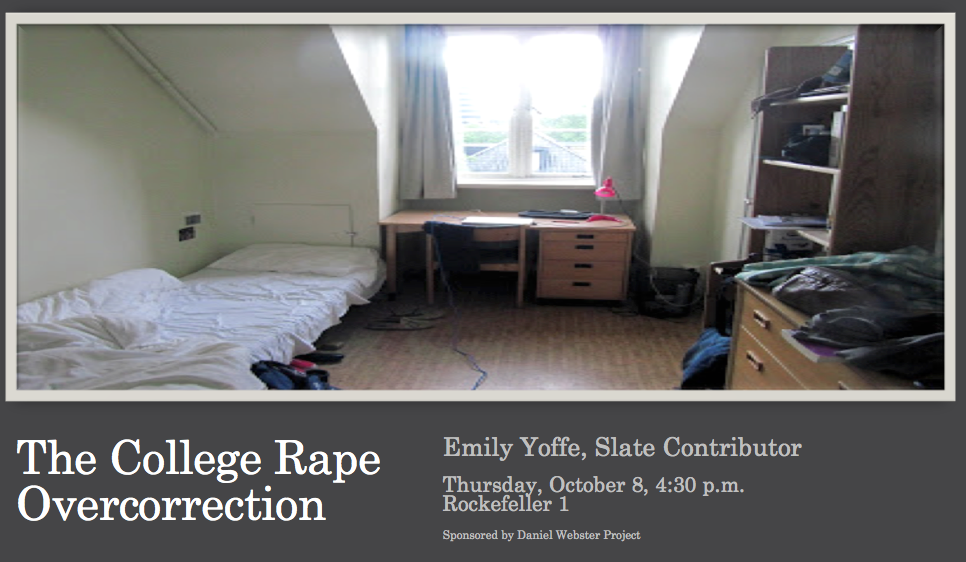Emily Yoffe is a Slate contributor who has written the magazine’s Dear Prudence advice column since 2006. She also writes for Slate about culture, health, politics, and science. Emily’s writing has appeared in many publications, including Esquire, The Los Angeles Times, the New Republic, the New York Times, O the Oprah Magazine, and The Washington Post. She is the author of the book What the Dog Did: Tales from a Formerly Reluctant Dog Owner. She was a National Magazine Award finalist this year for her Slate story, “The College Rape Overcorrection.” She was a John S. Knight Journalism Fellow at Stanford University. She is a graduate of Wellesley College.
Published on the Valley News (http://www.vnews.com)
Editorial: At Dartmouth, Talking About Sexual Assault
Wednesday, October 14, 2015
(Published in print: Wednesday, October 14, 2015)
Writer Emily Yoffe, best known for her “Dear Prudence” advice column in Slate, was on the Dartmouth campus the other day to offer guidance on a difficult subject — sexual assault at colleges and universities. The information wasn’t what some wanted to hear.
Victims of sexual assault and their advocates, including a group of placard-carrying students who staged a pointed but respectful protest during Yoffe’s remarks last Thursday, reject her argument that policies adopted by colleges to protect victims have gone too far.
The argument started last December, when Slate published Yoffe’s 12,000-word article, “The Campus Rape Overcorrection.” The headline was unfortunate, in that Yoffe does not deny that sexual assault is a serious problem too long dismissed by colleges and universities. She asserts, however, that higher education institutions, under federal pressure to prevent sexual violence and punish offenders, often abrogate the civil rights of those accused of sexual assault, denying them justice.
Moreover, Yoffe dares to challenge common assumptions, including that rape is alarmingly prevalent on U.S. campuses. She also wonders whether policies requiring women to consent to every step of a sexual encounter, like the one adopted by Dartmouth, were formulated by people who’ve ever had sex.
These are fighting words to feminists and others who regard the “affirmative consent” standard — “yes means yes” — as empowering, a safeguard against unwanted sexual advances.
Whatever your perspective on sexual politics, Yoffe makes some valid points. First, she is skeptical of the methodology behind surveys that suggest sexual assault is an “epidemic” on U.S. campuses. For example, an oft-cited survey commissioned in 2000 by the U.S. Department of Justice, and the basis of President Obama’s campaign to protect students against sexual violence, concluded that sexual assault affects as many as one in four undergraduates. But in a footnote the authors of that survey acknowledge making assumptions that increase the presumed risk. They warn that the one-in-four figure is merely “suggestive.” Other surveys are based on small sample sizes, which distort the numbers.
Sexual assault figures collected by colleges to comply with the federal Clery Act, which requires institutions to annually report crime data, suggest that the rate of sexual assault is lower than 25 percent. Reported assaults represent about 0.03 percent of the total 12 million female college student population, according to Clery data. Even accounting for the fact that sexual assault is a disturbingly underreported crime, it’s hard to square the Clery numbers with the one-in-four figure.
Statistics commonly cited by the media imply that “American college women are raped at a rate similar to women in Congo, where rape has been used as a weapon of war,” Yoffe writes.
Second, the debate over what to do about “sexual assault” is muddled by the fact that the term can in some contexts mean anything from forcible rape to unwanted touching. This is not to dismiss any aspect of sexual harassment or violence against women. It’s to suggest that the problem itself isn’t adequately defined, and that some data on sexual assault reflect blurred distinctions.
It’s too bad that Yoffe has been accused of insensitivity, of attacking victims and women generally. We commend Yoffe for challenging the facts and standing up for the rights of the accused. That doesn’t take away from the seriousness of sexual assault, which colleges and universities must continue to combat forcefully but fairly.
Source URL:http://www.vnews.com/opinion/19006586-95/talking-aboutsexual-assault

